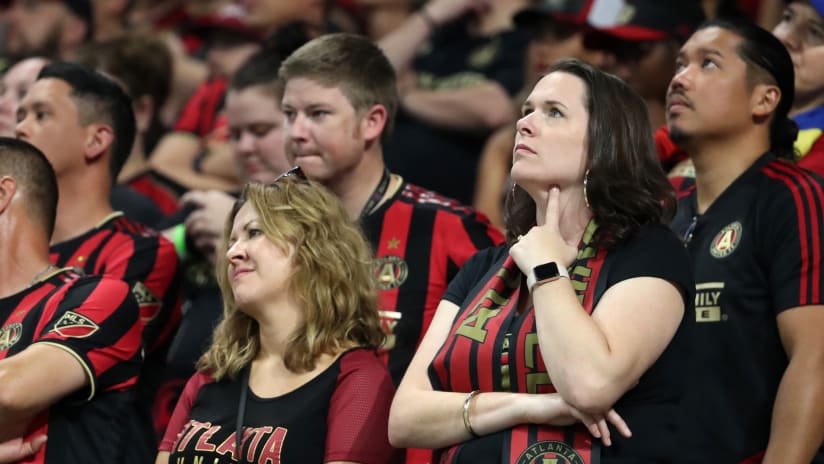As most readers will know well, many of us modern internet people hide our suffering behind a veneer of savage humor. So when taking the temperature of the Atlanta United fanbase this week, I gleaned almost as much from the sarcastic posts as the sincere expressions of doubt and disquiet rippling across a community that’s enjoyed a luxurious diet of goals, trophies and adulation since arriving in MLS in 2017.
“Against Modern Football T-Shirt Added To Online Shopping Cart As Atlanta United Fan Crams 10 Year Existential Crisis Into 1 Off-Season,” blared one headline on soccer satire site The Nutmeg News.
“Is this the year we finally lose to Orlando?” fretted a post on the ATLUTD Reddit, and even though the creator was just wisecracking at their rivals’ expense, the ensuing thread was quickly dotted with signs of the spirited debate unfolding among the Five Stripes faithful about the moves being made ahead of head coach Frank de Boer’s second season in charge.
This week it’s beloved winger Tito Villalba moving toward the exit, an apparent seven-figure outbound transfer to Paraguay turning over a prominent member of Atlanta’s inaugural roster during a transitional winter in which the likes of Darlington Nagbe, Leandro Gonzalez Pirez and Julian Gressel have already departed.
Perhaps more importantly, the club’s corresponding arrivals have generally been more modest in both number and prominence. That’s surely due in large part to reported holdups in the pursuit of targets like Santiago Arzamendia and Mathias Villasanti, and the Five Stripes still have time to get deals over the line before wading into Concacaf Champions League action on Feb. 18.
Yet there’s no denying the hint of gloom – a heretofore unfamiliar sensation to Atlanta’s “17s” – lurking among at least some quarters of a fandom where many consider a 2019 season with two trophy hoists to have been a disappointment.
“We knew we were going to get absolutely hammered by the fan base, let’s be honest,” was how VP and technical director Carlos Bocanegra phrased things after trading Gressel to D.C. United for a package of allocation money that could rise to seven figures. He’s also been commendably candid about the keen pressures brought on when a successful team bumps its head on the salary cap.
I certainly don’t have to tell Atlanta folks that absolutely no one in MLS feels the remotest bit of sympathy for them. Just gaze, for example, at their bitter Eastern Conference antagonists the New York Red Bulls, whose supporters have tasted about as much glory in 25 years as Atlanta have in three and are currently gnashing their teeth as a procession of proven performers hit the offseason door while younger and less recognized figures step up. And there are too many other long-suffering examples to count here.
I’ll admit that I personally don’t entirely understand de Boer’s master plan, or what he envisions his ideal Atlanta side looking and playing like. But it might not be fair to judge him in comparison to the large shadow cast by Tata Martino just yet.
Both of these front offices have earned at least a modicum of faith considering their recent body of work. Both are ahead of the MLS pack in terms of the wider shift toward the international norm of buying and selling aggressively, and with an eye for positive returns, on the transfer market. Besides, as handsome as he is, Villalba only scored one goal and four assists in 938 injury-disrupted league minutes last year. Beware the distorting effects of nostalgia.
Players come and go in this game, and only a precious few are good enough AND lucky enough to stick around and shine in one place for long periods.
And in this regard some fans’ experiences may be merging toward the global standard as well. A recent university study in the United Kingdom measured happiness data in that country alongside the results of English and Scottish soccer matches over a three-year period, and concluded thusly:
“The basic finding was clear. A victory by the local team had a positive effect on people’s happiness – but it was much smaller than the negative effect of a loss. In addition, the positive effect of a victory did not last as long as the negative effect of a loss. Because the misery of a loss is so much greater than the joy of a win, soccer matches made people a lot less happy on balance.”
So don’t get too gloomy, ATLiens. Things could be worse!











